Social Security Claiming Baffles Even Sophisticated Clients. Here's What Advisors Can Do.

Another key insight advisors can bring to their clients is a demonstration of the way working while drawing Social Security can impact the benefit amount, Lynch says. Assuming a person has reached the minimum claiming age but has not reached full retirement age, the basic mechanics are that the benefit amount is reduced by $1 for every $2 in earned income above $19,560.
Once that person reaches the full retirement age, the reduction is $1 for every $3 in earned income above $51,960. Beyond the full retirement age, in turn, there is no limit on earnings, and previously withheld earnings are also returned.
Clients are also very likely to ask their advisors about Social Security taxation, Lynch says. While the picture is complicated, there are some basic rules of thumb for advisors to share. F
or example, if a married couple’s combined income is less than or equal to $32,000, their benefits will not be taxed. Those couples with combined incomes between $32,001 and $44,000 will see up to half their benefit subject to income tax, with those couples with higher incomes can see up to 85% of their benefit taxed.
Ultimately, Lynch says, some of the most powerful strategies advisors can bring to bear for their clients involve identifying ways to reduce individuals’ and couples’ combined income, for example by utilizing Roth IRAs or Roth 401(k) accounts. Depending on the client’s situation, Roth conversions may be useful, or Social Security bridging strategies may deliver greater overall income.
Easing Client Fears Is Also Key
In the end, according to Lynch, perhaps the most important piece of information to deliver to clients is that Social Security is very unlikely to entirely disappear anytime soon. Benefits may end up being reduced or reformed in the future, but a wholesale elimination of Social Security “just isn’t in the cards.”
“This is often the elephant in the room when clients come in and start asking questions about Social Security,” Lynch explains. “Of course, I don’t have a crystal ball, but we think it is just very unlikely that the system would ever disappear all together. It’s just too important to far too many stakeholders, and frankly, I can’t imagine members of Congress or a future president standing in front of the American people and telling their voters that Social Security ended on their watch.”





